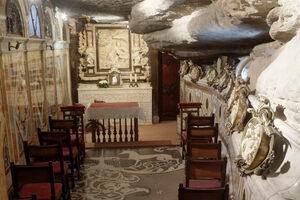Cave of Saint Ignatius in Manresa, Spain

Iñigo Lopez de Recalde (St Ignatius) after being wounded in the defense of Pamplona against French troops and renouncing his military career, began a pilgrimage to the Holy Land. At a stop in the neighboring city of Manresa in 1522, the young Ignatius said to be wearing only a sack robe, decided to live as a hermit in a cavern near the river.
Between history and legend, he was involved in mystical experiences and miraculous events. His visions and transfigurations were recorded in a manual on the meaning of life and divine love. Eleven months later, he continued his journey to Jerusalem and finally to Rome. In 1622, he founded the Society of Jesus or the Order of the Jesuits.
The cave is the main center of the Jesuits. The cavern where the saint wrote the Spiritual Exercises, was transformed over the centuries. First, it was a small hermitage. Later, it became a sanctuary dedicated to the saint, with a vestibule decorated with stained glass windows, reliefs, and mosaics that illustrated episodes of his life.
Both the anteroom and the cave were integrated into a baroque church that eventually became part of the Ignatian International Spiritual Center, a colossal 19th-century building built as a Jesuit residence.
The entrance to the cave is adorned by two angels sculpted by modernist artist Josep Llimona. The vestibule and other spaces are now museums filled objects related to St. Ignatius. A few artifacts include the reproduction of his sword, an espadrille, an autographed letter, and the wooden bowl from which he ate.
The cave of St. Ignatius is a fascinating telluric space. During the summer of 1887, at the height of the spiritualist phenomenon of the french pedagogue Allan Kardec, the cave was the scene of heated debates between traditional Catholics and fervent supporters of the new doctrine.





